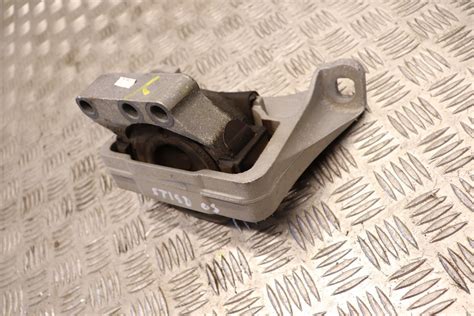Explore the importance, signs of wear, and benefits of upgrading engine mounts, plus a guide on what they are and how to replace them.When it comes to high-performance vehicles like the Ford Focus ST, every component plays a crucial role in delivering an exhilarating driving experience. One often overlooked part is the engine mount. This essential component not only secures the engine to the chassis but also absorbs vibrations and impacts, ensuring a smooth and responsive ride. Understanding the functionality of engine mounts, their significance, and the signs of wear is key to maintaining your vehicle’s performance. Whether you’re considering upgrading or simply need to replace worn mounts, being informed is vital. In this blog post, we will explore what engine mounts are, why they matter, how to recognize the signs of deterioration, and the benefits of replacing or upgrading them for a more dynamic driving experience. Let’s dive in!
What is an engine mount?
An engine mount is a crucial component of a vehicle’s suspension system, serving the essential purpose of securing the engine to the chassis while isolating vibrations and noise generated by the engine’s operation from the passenger compartment.
Typically made from a combination of rubber and metal, these mounts not only provide stability to the engine by absorbing the significant forces generated during acceleration and deceleration but also help to prevent unwanted movement that could lead to complications with the drivetrain and other related components.
The efficacy of engine mounts directly impacts vehicle performance and ride comfort, making it imperative for owners and technicians alike to understand their function and monitor their condition regularly to identify any signs of wear or failure that could compromise the integrity of the entire vehicle system.
Importance of engine mounts
Engine mounts are critical components in any vehicle, including the Ford Focus ST, serving the essential function of securing the engine to the vehicle’s chassis while simultaneously dampening vibrations and absorbing road shocks that can travel through the drivetrain. As these mounts provide stability for the engine, they also play a vital role in ensuring that various operational elements of the vehicle, such as the transmission and exhaust system, can function optimally without undue stress or misalignment.
In essence, the importance of engine mounts goes beyond mere physical support; they are crucial for the overall performance and longevity of the vehicle itself, as properly functioning mounts contribute to improved ride quality, enhanced engine performance, and reduced noise and vibration levels, making the driving experience much more enjoyable for the driver and passengers alike. When engine mounts become worn or damaged, it can lead to a multitude of issues, including excessive engine movement, transmission misalignment, and increased vibrations felt throughout the cabin, which can be not only uncomfortable but also detrimental to other mechanical components over time.
Moreover, investing in high-quality engine mounts can improve vehicle handling and responsiveness, allowing the Ford Focus ST to perform better during high-speed cornering and acceleration. Therefore, recognizing the importance of engine mounts and ensuring they remain in good condition should be a top priority for any car owner who values performance and reliability.
Signs of worn engine mounts
When it comes to the performance and longevity of your vehicle, engine mounts play a crucial role in ensuring that the engine is securely fastened to the chassis, providing stability and minimizing vibration; however, over time, these mounts can wear out due to a variety of factors such as age, vehicle mileage, and driving conditions, leading to a range of potential issues that drivers should be aware of.
One of the most common signs of worn engine mounts is an increase in vibration felt within the cabin of the Ford Focus ST; if you notice that the steering wheel, seat, or floorboards are vibrating more than normal, it may be a direct indication that the engine mounts have lost their ability to absorb and dampen engine vibrations, which can ultimately affect not just comfort but also handling and overall vehicle performance.
Another telling sign can often be observed under acceleration or during gear changes; if you experience noticeable clunking sounds or harsh bumps that feel out of place while shifting, this can signify that the mounts are no longer effectively holding the engine in place, leading to excessive movement and misalignment; thus, it is essential to address these symptoms promptly to avoid further damage and ensure
Replacing engine mounts
When it comes to the maintenance of your vehicle, particularly for enthusiasts of the Ford Focus ST, understanding the process of replacing engine mounts is crucial for ensuring optimal performance and longevity of the engine; the engine mount plays a pivotal role in securing the engine to the chassis, absorbing vibrations, and allowing for some movement inherently caused by the engine’s operation. In essence, replacing worn or damaged engine mounts not only preserves the integrity of your vehicle but also enhances the driving experience by minimizing excess vibrations and noises, thereby creating a smoother ride.
The first step in the replacement process involves properly diagnosing whether the engine mounts are indeed worn or damaged; common indicators include noticeable shifts in the engine positioning, unusual vibrations during acceleration, or any clunking sounds especially when shifting gears, and these problems, if left unaddressed, can lead to more severe issues down the line. Once you’ve confirmed the necessity for replacement, you can begin gathering the appropriate tools and, of course, the compatible engine mounts specifically designed for the Ford Focus ST, as the choice of parts will significantly affect the performance and reliability of the repair.
In summary, replacing engine mounts is not only about fixing a problem but also about boosting the overall safety and efficiency of your vehicle; after ensuring that your new mounts are installed correctly, it would be wise to keep an eye on them periodically, as taking proactive steps can lead to a more enjoyable and invigorating driving experience with your Ford Focus ST, as well as potentially avoiding costly repairs in the future. Remember, investing time and resources into maintaining such fundamental components is essential for any dedicated car owner who values reliability and performance.
Benefits of upgrading engine mounts
When considering the performance and longevity of your vehicle, particularly in models like the Ford Focus ST, upgrading engine mounts offers substantial benefits that can enhance not only the driving experience but also the overall reliability of the engine system.
One of the primary advantages of upgrading to high-performance engine mounts is the improved handling dynamics, as these aftermarket options effectively reduce excess engine movement, thereby providing a more solid connection between the engine and the chassis, which translates into enhanced traction and responsiveness, particularly during aggressive driving conditions.
Additionally, enhanced durability is another significant benefit of upgraded engine mounts, as they are typically made from superior materials that can withstand a greater degree of vibration and stress, resulting in a longer lifespan compared to standard mounts, which may degrade and fail over time, leading to costly repairs and potential damage to surrounding components.
Ultimately, investing in upgraded engine mounts can be seen as a proactive measure for car enthusiasts who want to not only enhance their vehicle’s performance but also ensure that their engine remains securely in place, thereby extending the life of their Ford Focus ST and improving overall ride quality.
Frequently Asked Questions
What is the primary function of the engine mount in a Ford Focus ST?
The engine mount’s primary function is to secure the engine to the vehicle’s chassis while absorbing vibrations and shocks produced by the engine’s operation.
What are common symptoms of a failing engine mount in a Ford Focus ST?
Common symptoms of a failing engine mount include excessive engine vibrations, unusual noises while driving, and a noticeable movement of the engine during acceleration or deceleration.
How often should engine mounts be inspected or replaced in a Ford Focus ST?
Engine mounts should be inspected during regular maintenance checks, typically around every 30,000 to 60,000 miles, or whenever symptoms of failure are noticed.
Can a worn engine mount affect the performance of a Ford Focus ST?
Yes, a worn or damaged engine mount can negatively affect the performance of the vehicle by causing misalignment, increased vibrations, and potentially leading to further mechanical issues.
What tools are needed to replace the engine mount in a Ford Focus ST?
Essential tools for replacing the engine mount typically include wrenches, sockets, a jack, and possibly an engine support or hoist to lift the engine safely during replacement.
Is replacing an engine mount a DIY task for Ford Focus ST owners?
Replacing an engine mount can be a DIY task for those with moderate mechanical skills. However, due to safety concerns and the complexity of the job, it may be best left to professionals for some.
What are the benefits of upgrading to aftermarket engine mounts for a Ford Focus ST?
Upgrading to aftermarket engine mounts can provide better engine stability, reduce unwanted movement during acceleration, and improve overall handling performance, particularly for modified or performance-oriented vehicles.





